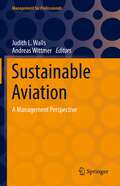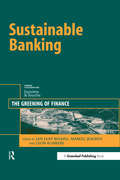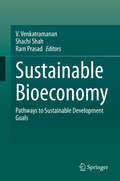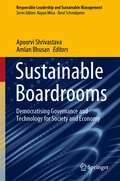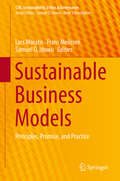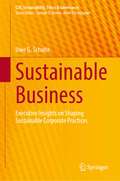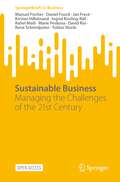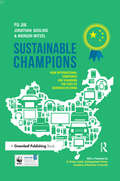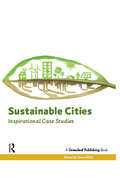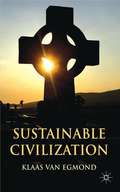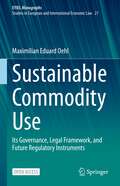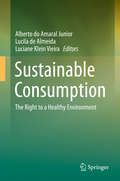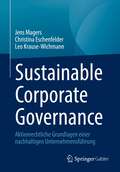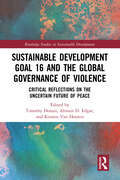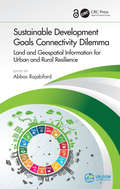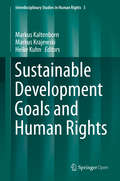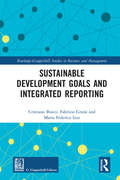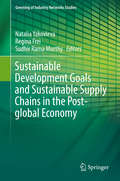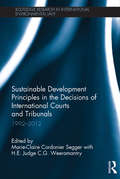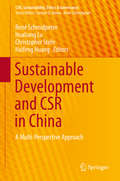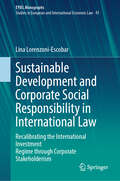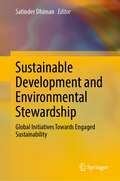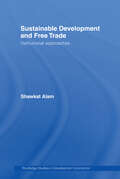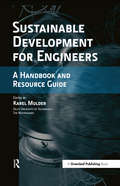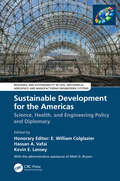- Table View
- List View
Sustainable Aviation: A Management Perspective (Management for Professionals)
by Andreas Wittmer Judith L. WallsThis book analyses from a management perspective how the aviation industry can achieve a sustainability transformation in order to reach the Paris climate targets for 2050 and provides various strategic and operational recommendations in this regard. It examines various elements of the aviation system exhaustively, including technologies, consumers, airlines, airports and policies, from both short- and long-term standpoints. Specific questions and contradictions, as well as concrete options for taking action, are presented. It also includes numerous practical case studies, which will help practitioners transfer the concepts into their everyday work. The book is aimed at a broad, professional audience consisting of managers, politicians and regulators, but also at advanced students engaged in academic and professional education.
Sustainable Banking: The Greening of Finance
by Marcel Jeucken Jan Jaap Bouma Leon KlinkersThis comprehensive addition to the debate on sustainable development has been produced in order to take a global pulse on how the financial services sector is responding to the growing challenge of shareholder and stakeholder expectations on social and environmental performance. In the opinion of many commentators in this new book, given the intermediary role banks play within economies, their potential contribution toward sustainable development is enormous. Indeed, for banks, the conclusion that corporate sustainability has become an investable concept that increases long-term shareholder value is becoming difficult to deny.To date, banks have been relatively slow to examine their exposure to risk (the environmental and social performance of their clients) and the business opportunities of sustainable development (the products and services they offer). Not before time, Sustainable Banking concludes that this is beginning to change, with both risk and opportunity becoming established elements in banking policies towards environmental sustainability. In addition, banks have now begun to take notice of and address their own environmental performance. Through the use of case studies and detailed analysis, the book examines the environmental policies of banks, the importance of transparency and communication with their stakeholders, environmental and ethical investment funds, current practice by the providers of financial services with regard to environmental risk management and, finally, the key role of government, NGOs and multilateral banks in delivering sustainability.Sustainable banking has not, however, been achieved and nor will it be in the immediate future. As globalisation proceeds apace, Sustainable Banking argues that improvements are necessary in banks' attitudes toward transparency and accountability with regard to their lending policies. In addition, in order to promote best practice, the leading banks need to start measuring their customers' environmental performance in order to persuade polluting clients that minimum compliance to regulations will no longer suffice. The book finds many shining examples in the co-operative, mutual and social sectors for the big players to emulate. Environmental and ethical considerations in such loan portfolios have proven to be profitable and "best-in-class" larger banks are now also reaping benefits.The unprecedented scope of the book has attracted contributors from four continents including Deloitte & Touche, Rabobank, The World Bank, The European Bank for Reconstruction and Development, The United Nations Environment Programme, The World Business Council for Sustainable Development, UBS, Henderson Investors, KPMG, The World Resources Institute and SAM Sustainability.
Sustainable Bioeconomy: Pathways to Sustainable Development Goals
by Ram Prasad Shachi Shah V. VenkatramananSustainable development is the most important challenge facing humanity in the 21st century. The global economic growth in the recent past has indeed exhibited marked progress in many countries. Nevertheless, the issues of income disparity, poverty, gender gaps, and malnutrition are not uncommon in the global landscape, in spite of the upward growth of the economy and technological advances. This grim picture is further exacerbated by our growing human population, unmindful resource use, ever-increasing consumption trends, and changing climate. In order to protect humanity and preserve the planet, the United Nations issued the “2030 agenda for sustainable development,” which includes but is not limited to sustainable production and consumption practices, e.g. in a sustainable bioeconomy. The hallmark of the sustainable bioeconomy is a paradigm shift from a fossil-fuel-based economy to a biological-based one, which is driven by the virtues of sustainability, efficient utilization of resources, and “circular economy.” As the sustainable bioeconomy is based on the efficient utilization of biological resources and societal transformations, it holds the immense potential to achieve the UN’s Sustainable Development Goals. This book shares valuable insights into the linkages between the sustainable bioeconomy and Sustainable Development Goals, making it an essential read for policymakers, researchers and students of environmental studies.
Sustainable Boardrooms: Democratising Governance and Technology for Society and Economy (Responsible Leadership and Sustainable Management)
by Apoorvi Shrivastava Amlan BhusanThis book discusses various interactions in the sustainability and development sector. It presents a thematic approach to describe progressive models and cases on disruptions, innovations, regulatory and institutional evolution related to the area of sustainability, through an organizational and boardroom level governance lens. It documents how certain schools of thought, models of engagement and methods-platforms-practices impact society and while doing so, brings together varying theoretical debates, practicing models and instruments of transformation in green governance. Sustainable policy making demands a whole of government approach in decision-making processes. Further, inclusiveness and ‘green’ consciousness of corporate boardrooms are paramount, without which, effective socially responsible business practices are absurd. Human resource development, shaped on sustainable corporate ethics, requires well-trained sustainability specialists, managers that can think ‘green’ in their overall decision making which are essential for green governance. In this context, the book creates a functional, interpretive repertoire of stories, commentaries, life experiences, and reflections of corporate leaders, academics, and practicing consultants, on their decision-making processes, and how they interpret sustainability. These stories and thoughts help create a functional academic construct, which will assist academics teach ‘green’ competencies to business school students better, and entrepreneurs and business executives to better understand the idea of sustainable growth.
Sustainable Business Models: Principles, Promise, and Practice (CSR, Sustainability, Ethics & Governance)
by Samuel O. Idowu Frans Melissen Lars MoratisThis book provides a rich overview and takes a closer look at the current state of theory and practice in the field of sustainable business models. The chapters in this book examine and analyze existing and new approaches towards sustainable business models and showcase the implementation of sustainable business through both quantitative and qualitative studies, including several case studies and many practical examples. It approaches these issues from the standpoints of diverse business disciplines to yield new insights and ideas that are relevant from both an academic and professional perspective. In its essence, the book examines how firms’ value creation processes can be driven by sustainability and social responsibility and how this impacts business and society. Readers will find a range of sustainable business models that have been employed and are being pioneered in various industries around the globe – which are thoroughly investigated and discussed, and put into a comprehensive conceptual framework.
Sustainable Business: Executive Insights on Shaping Sustainable Corporate Practices (CSR, Sustainability, Ethics & Governance)
by Uwe G. SchulteThis book presents discussions with corporate practitioners on several topics around sustainability. Between May 2019 and November 2022, the author engaged in dialogues with Senior Executives representing major multinational corporations, overseeing their corporate sustainability endeavours. The thematic spectrum of these conversations encompassed diverse topics such as The United Nations Sustainable Development Goals, Water-stressed regions, Ocean Plastic, Chemical Recycling, Renewable Energy, Sustainable Tourism, and the Just Transition, among others, with each episode concentrating on a singular subject. In this book supporting illustrations and graphs together with background references enrich the insights the conversations convey. The reader will learn about the sustainability challenges companies are facing and how they approach them. The book gives examples of sustainable solutions and international collaborations around greenhouse gas reduction, circular economy, restorative tourism as well as reducing plastic pollution and other global sustainability challenges.
Sustainable Business: Managing the Challenges of the 21st Century (SpringerBriefs in Business)
by René Schmidpeter Manuel Fischer David Risi Ingrid Kissling-Näf Daniel Foord Jan Frecè Kirsten Hillebrand Rahel Meili Marie Peskova Tobias StuckiThis open access book is a compact guide to the development of sustainable business, which has become the central concept in discussions about the future development of humanity and planet earth. It provides basic terminology and concepts on sustainable business and offers insights into a new management paradigm that integrates social and environmental dimensions into business models, strategies, and operations. New business concepts such as the donut economy, the circular economy, social innovation and sustainable leadership are introduced and the book outlines how they influence the way we run businesses today and in the future. This book lays the foundation for new management thinking in business and academia, making it a essential reader for professionals and students alike.
Sustainable Champions: How International Companies are Changing the Face of Business in China
by Jonathan Gosling Morgen Witzel Fu JiaIn the face of strong competitive pressure and a dynamic market, multinational companies in China are forced to innovate with extraordinary pace and inventiveness. Environmental sustainability is a vital benchmark, and is a key driver for the best companies in each sector – many of them allied with the WWF Climate Savers programme.Sustainable Champions shows how nine leading multinational companies – including Nestlé, HP, Tetra Pak and Sony – are dealing with environmental, supply chain and ethical challenges in China. The book illuminates some of their transformative practices, and the impact this is having on business in China and beyond. The concluding cross-case analysis of supply chain and environmental challenges faced by leading international firms presents key lessons for business and for sustainability champions.Sustainable Champions: How International Companies are Changing the Face of Business in China is essential reading for researchers and course leaders seeking on-the-ground examples of local environmental challenges, and any company doing business in one of the world’s fastest-growing economies.With a Foreword by Simon Zadek, Distinguished Fellow, Academy of Business in Society, Visiting Scholar, Tsinghua School of Economics and Management.
Sustainable Cities: Inspirational Case Studies
by Simon MillsWinners and nominees of the 2013/14 Sustainable City Awards present their case stories in a new collection, Sustainable Cities: Inspirational Case Studies. These short, easy-to-read stories will serve as an inspiration to others around the world in the quest to make our cities more sustainable.The awards were established in 2001 by the City of London Corporation and aim to recognise and reward organisations that have demonstrated excellence in sustainable development. Sustainable Cities is published by Greenleaf Publishing in association with the City of London.
Sustainable Civilization
by Klaas Van EgmondWestern civilization has entered a new fundamental crisis that can be explained by a very one-sided orientation of social values based on materialism and egocentrism, which is disrupting the delicate balance between the opposing forces of 'mind' and 'matter', and of 'I' and 'the others'. Many sources from the great works of philosophy, religion, art and culture to social surveys and the course of history qualify sustainability as the dynamic equilibrium between fundamental opposing forces. This insight and the ethical ability to better discriminate between stabilizing and destabilizing forces would allow further justification of human rights and new institutional arrangements in society at large and, in particular, in politics, economy and finance. It would enable a sustainable civilization to flourish within the boundaries of freedom and human dignity. "
Sustainable Commodity Use: Its Governance, Legal Framework, and Future Regulatory Instruments (European Yearbook of International Economic Law #21)
by Maximilian Eduard OehlThis open access book examines the governance and legal landscape of the global commodity sector. For that purpose, the author conceptualises both Global Commodity Governance (GCG) as well as Transnational Commodity Law (TCL). He defines the key terms of Global Commodity Governance, delineates the underlying legal framework of Transnational Commodity Law, and assesses the effectiveness of Transnational Commodity Law in fostering a functional commodity sector. “Sustainable Commodity Use” is based on a comprehensive analysis of over 250 international agreements, standards, and guiding documents. The author distils the main findings into a conceptualisation of Transnational Commodity Law and provides the reader with a succinct overview of its normative configurations as well as regulatory gaps. Moreover, he elaborates a taxonomy of International Commodity Agreements. In addition, an outline of the normative substance of Transnational Commodity Law features in an appendix to the main text. The author concludes by making concrete suggestions on how rules regulating commodity activities de lege ferenda could and should be designed to improve the effectiveness of law regulating transnational commodity activity. In doing so, he demonstrates the application of the sustainable use principle as the overall objective and purpose of Transnational Commodity Law and discusses International Commodity Agreements as future regulatory instruments. This book may assist lawmakers, practitioners, civil society advocates, and academics worldwide in developing a legal framework for sustainable global commodity activity.
Sustainable Consumption: The Right to a Healthy Environment
by Lucila De Almeida Alberto do Amaral Junior Luciane Klein VieiraThis book provides a broad understanding of whether law plays a role in influencing patterns of sustainable consumption and, if so, how. Bringing together legal scholars from the Global South and the Global North, it examines these questions in the context of national, transnational and international law, within single and plural legal systems, and across a range of sector-specific issue areas.The chapters identify how traditional legal disciplines (e.g. constitutional law, consumer law, public procurement, international public law), sector-related regulation (e.g. energy, water, waste), and legal rules in specific areas (e.g. eco-labelling and packing) engage with the concept of sustainable consumption. A number of the contributions describe this relationship by isolating a national legal system, while others approach it from the vantage point of legal pluralism, exploring the conflicts and convergences of rules between multiple international treaties (or guidelines) and those between the rules of international and transnational law (or both) vis-à-vis national legal systems. While sustainable consumption is recognised as an important field of interdisciplinary research linking virtually all social science disciplines, legal scholarship, in contrast, has neglected the importance of the field of sustainable consumption to the law. This book fills the gap.
Sustainable Corporate Governance: Aktienrechtliche Grundlagen einer nachhaltigen Unternehmensführung
by Jens Magers Christina Eschenfelder Leo Krause-WichmannDas Buch vermittelt kompakt und verständlich die wichtigsten rechtlichen Aspekte einer nachhaltigen Unternehmensführung bei einer Aktiengesellschaft deutschen Rechts. Beispiele aus der Praxis dienen zur Veranschaulichung. Dabei befasst sich das Buch mit zwei großen Themenkomplexen.Erstens: Wie können (und ggf. müssen) Vorstand, Aufsichtsrat und Hauptversammlung Sozial- und Umweltbelange fördern? Welche Rolle kommt ihnen dabei innerhalb der Organisationsverfassung zu und welche Möglichkeiten der Binnenorganisation erlaubt das Aktienrecht?Zweitens befasst es sich mit der Frage, wie der Gesetzgeber zur Einhaltung bestimmter Governance-Praktiken drängt. Welchen Anforderungen an Diversität und Fachkompetenzen müssen Mitglieder von Vorstand und Aufsichtsrat genügen? Welche Vorgaben bestehen für Nachhaltigkeitsparameter bei der Vergütung des Vorstands?Die Autoren vermitteln einen Überblick über die einschlägigen rechtlichen Grundlagen und zeigen fundiert die wesentlichen Themen einer Sustainable Corporate Governance nach deutschem Aktienrecht auf.Der InhaltBegriffsklärungenCorporate Governance KodizesCodes of Conduct und ComplianceDer VorstandDer AufsichtsratDie HauptversammlungDiversitätKompetenzenVergütung des Vorstands
Sustainable Development Goal 16 and the Global Governance of Violence: Critical Reflections on the Uncertain Future of Peace (Routledge Studies in Sustainable Development)
by Timothy Donais Alistair D. Edgar Kirsten Van HoutenThis book brings together a diverse range of scholars and practitioners working at the nexus of peace and development to reflect, at the mid-way point of the Sustainable Development Goals implementation period, what impact Goal 16 has made, or may yet make, toward reducing violence in ‘all its forms.’ Adopted in 2015, the Sustainable Development Goals include 17 objectives designed to shape and direct the global development agenda through to 2030, with Goal 16 aiming to promote ‘peaceful and inclusive societies for sustainable development.’ Amidst an ongoing global pandemic, evidence of a fracturing liberal international order, and the persistence of seemingly intractable conflict in large parts of the world, this volume takes stock of current progress toward providing access to justice and ensuring inclusive and democratic institutions. Across 15 chapters, the book’s contributors explore the universal aspirations of Goal 16 and its specific implications for conflict-affected states, which continue to experience ‘development in reverse,’ and for historically marginalized groups such as women, youth, the disabled, and indigenous peoples. In doing so, it offers a comprehensive assessment of Goal 16’s broader contribution to the creation of a more just, peaceful world against the realities of societies emerging from the COVID-19 pandemic and grappling with a deepening climate crisis. This volume will appeal to scholars, researchers, policymakers, and postgraduate students in sustainable development, global governance, international relations, global development, international law, and political science.
Sustainable Development Goals Connectivity Dilemma: Land and Geospatial Information for Urban and Rural Resilience
by Abbas RajabifardThe Open Access version of this book, available at https://doi.org/10.4324/9780429290626, has been made available under a Creative Commons Attribution-Non Commercial-No Derivatives 4.0 license. Large-scale migration from rural to urban areas, and between countries, affects sustainable development at local, national, and regional levels. To strengthen urban and rural resilience to global challenges, Sustainable Development Goals Connectivity Dilemma: Land and Geospatial Information for Urban and Rural Resilience, brings together leading international geospatial experts to analyze the role of land and geospatial data infrastructures and services for achieving the United Nations' Sustainable Development Goals (SDGs). While the goals outlined in the 2030 Agenda have been longstanding aspirations worldwide, the complexity and connectivity between social, economic, environmental, and governance challenges are changing with large-scale urbanization and population growth. Structured in 5 parts, the themes and objectives of the book are in line with the critical challenges, gaps, and opportunities raised at all UN-GGIM events and UN-GGIM Academic Network forums. Through the different perspectives of scholars, industry actors, and policy-makers, this book provides interdisciplinary analysis and multisectoral expertise on the interconnection between the SDGs, geospatial information, and urban and rural resilience. Sustainable Development Goals Connectivity Dilemma: Land and Geospatial Information for Urban and Rural Resilience is an essential reference for researchers, industry professionals, and postgraduate students in fields such as geomatics, land administration, urban planning, GIS, and sustainable development. It will also prove a vital resource for environmental protection specialists, government practitioners, UN-GGIM delegates, and geospatial and land administration agencies. Features: Introduces a holistic and new approach to sustainable development Brings together social, economic, and environmental dimensions of sustainability Highlights the significance and the role of geospatial information in sustainable development Examines urban and rural interdependencies in the context of strengthening resilience Written by experts with diverse academic and professional backgrounds who examine connectivity and develop strategic pathways
Sustainable Development Goals and Human Rights (Interdisciplinary Studies in Human Rights #5)
by Markus Krajewski Markus Kaltenborn Heike KuhnThis open access book analyses the interplay of sustainable development and human rights from different perspectives including fight against poverty, health, gender equality, working conditions, climate change and the role of private actors. Each aspect is addressed from a more human rights-focused angle and a development-policy angle. This allows comparisons between the different approaches but also seeks to close gaps which would remain if only one perspective would be at the center of the discussions. Specifically, the book shows the strong connections between human rights and the objectives of the 2030 Agenda for Sustainable Development and the Sustainable Development Goals adopted by the United Nations in 2015. Already the preamble of this document explicitly states that “the 17 Sustainable Development Goals ... seek to realise the human rights of all”. Moreover, several goals and targets of the 2030 Agenda correspond to already existing individual human rights obligations. The contributions of this volume therefore also address how the implementation of human rights and SDGs can reinforce each other, but also point to critical shortcomings of the different approaches.
Sustainable Development Goals and Integrated Reporting (Routledge-Giappichelli Studies in Business and Management)
by Cristiano Busco Fabrizio Granà Maria Federica IzzoOur planet faces massive economic, social, and environmental challenges. To deal with these challenges, the United Nations has promoted 17 Sustainable Development Goals (SDGs) to define global priorities and aspirations for 2030, and Governments worldwide have already agreed on these goals. In order to approach them practically, private and public organizations have to contribute to make SDGs happen by identifying and executing sustainable strategies as key drivers of their visions and business models. Building on the emerging concept of Integrated Thinking (IT), this book explores how modern organizations can leverage a long-term integrated strategy to reconcile financial stability with social and environmental sustainability and create enduring value for all stakeholders. By focusing on the value-creating role of business organizations in delivering on the promise of sustainable and inclusive development, the book enriches the debate on Integrated Thinking and Integrated Reporting (IR), with particular emphasis on the value creation process. This book offers an opportunity to discuss the way in which business organisations can rethink their management processes, accounting tools and reporting solutions, as they strive for both competitiveness and growth while contributing to the achievement of the SDGs, and long-term value creation more broadly. Based on the analysis of different case studies, the book explores how organizations are approaching these challenges and how they are connecting SDGs, to business models and strategies. Analysing the impact of SDGs on materiality, connectivity, and stakeholder engagement, this book provides an insight into how Integrated Thinking, Management and Reporting is currently practiced and in which way these managerial innovations can contribute to SDGs.
Sustainable Development Goals and Sustainable Supply Chains in the Post-global Economy (Greening of Industry Networks Studies #7)
by Natalia Yakovleva Regina Frei Sudhir Rama MurthyThis book presents a collection of studies on current best practices for delivering sustainable development policies within supply chains. It critiques the limitations of existing business theory and practice on sustainable supply chain management, and discusses opportunities for new conceptual models for businesses to engage with Sustainable Development Goals (SDGs). It examines how businesses can work towards implementing Sustainable Development Goals in the contexts of entrepreneurial initiative, industry collaboration and regional development. SDGs renew the sustainable development agenda for global communities and ask businesses and organisations to reset their sustainable development policies. A strategy to embed sustainable development principles into business operations along the supply chain operations, which has been a conceptual and, in many instances, practitioner, business and industry achievement of the past decades, is not enough to shift the economic and social conditions of poor populations around the world. How would the global supply chains of the future look like? What social relations does it envisage? How will businesses and organisations engage with societies, environments and complex institutional contexts in emerging markets and developing countries, which are faced with issues of population growth, needed leaps in infrastructure provision, educational and health improvements, cultural and institutional shifts? The books challenges current approaches to sustainable supply chain practices guided by discussion on SDGs. It reviews implementation issues of existing sustainable development approaches, assesses the advancement of sustainable development strategies and examines the opportunities for global value chains to increase their positive social and environmental inputs in regions, communities and organisations. The book collects both conceptual and empirical studies set in a variety of business and organisational contexts, such as manufacturing, retail, procurement, cities and industrial parks. It contests the accepted axioms of sustainable practices in the global supply chains and proposes new models for organisations and production networks to engage with societies and address market and production effects on communities and institutions.
Sustainable Development Principles in the Decisions of International Courts and Tribunals: 1992-2012 (Routledge Research in International Environmental Law)
by Marie-Claire Cordonier Segger Judge C.G. WeeramantryThe 2002 New Delhi Declaration of Principles of International Law relating to Sustainable Development set out seven principles on sustainable development, as agreed in treaties and soft-law instruments from before the 1992 Rio ‘Earth Summit’ UNCED, to the 2002 Johannesburg World Summit on Sustainable Development, to the 2012 Rio UNCSD. Recognition of the New Delhi principles is shaping the decisions of dispute settlement bodies with jurisdiction over many subjects: the environment, human rights, trade, investment, and crime, among others. This book explores the expanding international jurisprudence incorporating principles of international law on sustainable development. Through chapters by respected experts, the volume documents the application and interpretation of these principles, demonstrating how courts and tribunals are contributing to the world’s Sustainable Development Goals, by peacefully resolving disputes. It charts the evolution of these principles in international law from soft law standards towards recognition as customary law in certain instances, assessing key challenges to further judicial consideration of the principles, and discussing, for instance, how their relevance for compliance and disputes related to the 2015 Paris Agreement on climate change. The volume provides a unique contribution of great interest to law and policy-makers, judges, academics, students, civil society and practitioners concerned with sustainable development and the law, globally.
Sustainable Development and CSR in China
by René Schmidpeter Hualiang Lu Christopher Stehr Haifeng HuangThis book offers an in-depth analysis of Corporate Social Responsibility, gathering contributions by authors from various countries, cultures and political systems. It provides readers with a better understanding of the concept and its implementation in China by pursuing an international approach. The respective contributions examine Corporate Social Responsibility in terms of its close ties to ecology, corporate sustainability and the future of specific industries. The book is the product of two international meetings, the "Ecological Education and Sustainable Development Forum" in Chengdu, China, and the "CSR & Business Sustainability Development Forum" in Shenzen, China.
Sustainable Development and Corporate Social Responsibility in International Law: Recalibrating the International Investment Regime through Corporate Stakeholderism (European Yearbook of International Economic Law #43)
by Lina Lorenzoni-EscobarIs sustainable development merely a convenient catchphrase or does it have a real bearing on international law? And is corporate social responsibility an internationally legally void concept, subject to unbridled corporate appropriation and misappropriation? This book addresses these two pivotal questions through a transnational lens, combining theoretical and practical insights into sustainable development and corporate social responsibility for academics and legal practitioners alike. The book&’s chapters address topics such as sustainable development&’s legal and normative structure – concluding it is a principled customary international norm –; the interrelation of sustainable development and corporate social responsibility – through what the author refers to as the &“principle of stakeholderism&” within the UN-led building blocks of sustainable development –; the trend of their inclusion in international investment agreements – which points to the urgency of the current reflection on their normative and legal makeup; and lastly, the implications for international corporate subjectivity of corporate social responsibility as a sustainable development-mandated undertaking. In this regard, the author posits that sustainable development is the binding framework for corporate social responsibility, understood then as a space for regulated corporate self-regulation, where corporate discretion is bound by the objectives, pillars and operative principles of sustainable development. In turn, the author describes how sustainable development, through corporate social responsibility, realigns international investment agreements, both horizontally and especially vertically. As the implications of this view of corporate subjectivity transcend international investment law, the book represents a valuable contribution to the fields of international economic law, sustainable development, corporate social responsibility, and business and human rights.
Sustainable Development and Environmental Stewardship: Global Initiatives Towards Engaged Sustainability
by Satinder DhimanThis book builds on recent advances in the theory of sustainable development and links it with environmental stewardship in a dialectical manner, as envisioned by global scholars in this emerging field. Environmental stewardship deals with practical issues of ecosystem management and governance to address changes in socio-ecological systems to sustain the supply and availability of ecosystem services by society. It means reducing our total footprint on the planet, not just carbon footprint. Truly global in scope, this volume is a humble offering of more than 12 scholars and practitioners from around the world to the exciting adventure of sustainable development and eco-stewardship. Featuring topics such as climate change, organizational sustainability, green innovation, and urban governance, this book is useful for policy makers, managers of NGOs, and sustainability researchers in developing engaging strategies for a more sustainable planet.
Sustainable Development and Free Trade: Institutional Approaches (Routledge Studies In Development Economics Ser.)
by Shawkat AlamExamining institutions rather than themes, this critical book provides a comprehensive survey of the inter-relationship between trade-induced economic growth and the environment and its impact on the global quest for sustainable development. Focusing in particular on the interests and concerns of developing countries and the skewing of internationa
Sustainable Development for Engineers: A Handbook and Resource Guide
by Karel MulderIt is crucial that engineers – from students to those already practising – have a deep understanding of the environmental threats facing the world, if they are to become part of the solution and not the problem. Is there a way to reconcile modern lifestyles with the compelling need for change? Could new improved technologies play a key role? If great leaps in the environmental efficiency of technologies are needed, can they be produced? Engineers are in a privileged and hugely influential position to innovate, design and build a sustainable future. But are they engaged or uninterested? Are they knowledgeable or ignorant? This book has been developed by a number of committed educators in European engineering departments under the leadership of Delft University of Technology and the Technical University of Catalunya to meet the perceived gap between what engineers know and what they should know in relation to sustainable development. The University of Delft decided as long ago as 1998 that all of its engineering graduates, working towards careers as designers, managers or researchers, should be prepared for the challenge of sustainable development and, as such, should leave university able to make sustainable development operational in their designs and daily practices. The huge amount of knowledge gathered on best-practice teaching for engineers is reflected in this book. The aim is to give engineering students a grounding in the challenge that sustainable development poses to the engineering profession, the contribution the engineer can make to attaining some of the societal and environmental goals of sustainability, and the barriers and pitfalls engineers will likely need to confront in their professional lives. Concise but comprehensive, the book examines the key tools, skills and techniques that can be used in engineering design and management to ensure that whole-life costs and impacts of engineering schemes are addressed at every stage of planning, implementation and disposal. The book also aims to demonstrate through real-life examples the tangible benefits that have already been achieved in many engineering projects, and to highlight how real improvements can be, and are being, made. Each chapter ends with a series of questions and exercises for the student to undertake. Sustainable Development for Engineers will be essential reading for all engineers and scientists concerned with sustainable development. In particular, it provides key reading and learning materials for undergraduate and postgraduate students reading environmental, chemical, civil or mechanical engineering, manufacturing and design, environmental science, green chemistry and environmental management.
Sustainable Development for the Americas: Science, Health, and Engineering Policy and Diplomacy (Resilience and Sustainability in Civil, Mechanical, Aerospace and Manufacturing Engineering Systems)
by E. William ColglazierEnvironmental sustainability efforts require a great deal of engagement and political will, ranging from local communities to state departments. Science diplomats—from experts and scientists to spokespersons and ambassadors—can help facilitate at all levels and yield valued resources from technology sharing, capacity building, and knowledge exchanges. This book explores the importance of sustained international scientific cooperation, building community resilience, and the role of political will in sustainability and diplomacy. It shows how even small diplomatic efforts can influence myriad issues, from overfishing to human rights negotiations to global carbon emission reduction. Features: • Examines various topics such as global climate change, arid environments, water security and governance, trans-boundary conflict and cooperation, urban and rural resilience, and public health. • Presents case studies from various geographic regions through the lens of diplomacy, including the US–Mexico border, the Gulf of California, South America, Europe, the Middle East, Central and South Asia, and China. • Discusses how building networks of people, organizations, and countries engaged in science diplomacy is crucial for mutual growth and for overcoming conflicting political stances. Sustainable Development for the Americas: Science, Health and Engineering Policy and Diplomacy provides a useful resource for diplomats, policymakers, students, and decision-makers. It provides numerous examples of how using science and technology for policy and diplomacy is essential to finding common ground among nations for a collective global benefit.
